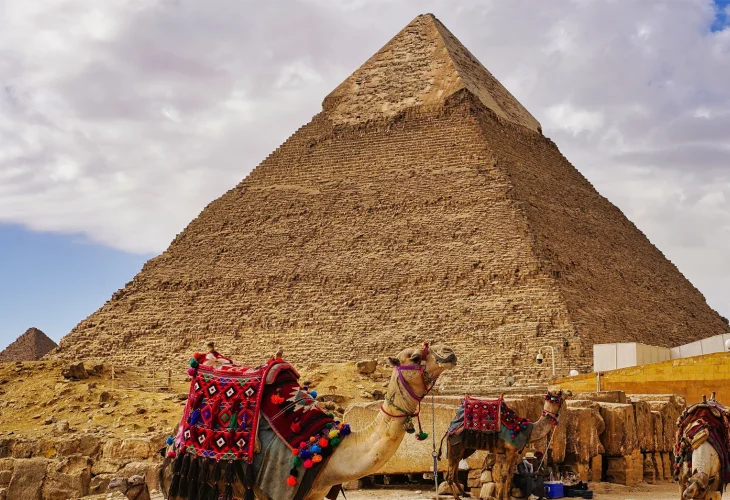The Lost Community: A Journey Through Jewish Egypt's Tragic Decline
On September 22, 1948, a seemingly innocent ice cream cart rolled into Cairo's Jewish quarter on a scorching afternoon. Dozens of children gathered around it. The 'vendor' lit a cigarette, left it on the cart, and disappeared. The cart was a massive bomb. Two buildings collapsed, causing many casualties.
 (Photo: shutterstock)
(Photo: shutterstock)When the Israelites left Egypt, Hashem promised them, "As you have seen the Egyptians today, you shall see them no more." For many years, there were no Jews in Egypt. However, close to the time of the First Temple's destruction, Jews went into exile in Egypt, as foretold in the Torah's exile curses: "And Hashem shall bring you back to Egypt."
For centuries, a Jewish community existed in Alexandria, Egypt, and other areas. Over time, the original Egyptian culture faded and was replaced by Arab Muslims who largely came from the Arabian Peninsula.
In the twentieth century, Egypt was home to a thriving Jewish community, including the esteemed rabbi, Rav Ovadia Yosef z"l. Yet, the Egyptians treated the Jews harshly, forcing most to leave. These events coincided with Israel's statehood, and thus didn't gain broader historical attention.
On November 2, 1945, brutal riots erupted in Cairo and Alexandria. Mobs burned the grand Ashkenazi synagogue in Cairo, desecrated 27 Torah scrolls, destroyed a soup kitchen, an old age home, a shelter for the needy, and wrecked Cairo's Jewish school. Jews in Alexandria were attacked on the streets.
As talks of establishing a Jewish state progressed, Hussein Heikal Pasha, Egypt's delegate to the Arab League, warned, "If a Jewish state is established, the lives of a million Jews in Muslim countries will be in danger." Around that time, as the British mandate was ending, King Farouk of Egypt issued a stamp with his portrait and a map of Egypt including southern Israel, confident he'd easily defeat the Jewish army. Concurrently, he arrested numerous Jewish businessmen, confiscating their assets to fund his war. That month, 1,300 Jews were detained on charges of 'Zionism.' Jewish-owned companies were nationalized.
Despite his expectations, Farouk lost the war, suffered a sharp defeat, and fled with his remaining troops back to Egypt. The Egyptians vented their anger on Egypt's Jews, who suffered terribly in the summer of 1948. On June 19, a bomb exploded in Cairo's Jewish quarter. Twelve buildings collapsed, 22 Jews were killed, 41 injured, and only a child named Yosef Levi, who later worked at Israel Aerospace Industries and now lives in Herzliya, survived from the collapsed buildings. The riots resumed in July; hundreds of Jewish businesses were looted and destroyed, a bomb was planted in the large 'Cicurel' department store owned by the Jewish community head in Cairo, resulting in over a hundred Jewish deaths.
On September 22, 1948, an ice cream cart entered Cairo's Jewish quarter on a hot afternoon. Dozens of children gathered around. The 'vendor' lit a cigarette, left it on the cart, and left. The cart housed a massive explosive. Two buildings collapsed, causing many casualties. An eleven-year-old girl, Rosa Molcho, survived the collapsing buildings; she currently resides in Rehovot. The Muslim Brotherhood claimed responsibility for the bombing.
After Israel's War of Independence ended and the country stabilized, Egypt calmed for a time. However, years later, the riots resumed with increasing intensity. On Black Saturday, January 26, 1952, new riots exploded. Five hundred Jewish businesses were set ablaze, and property was plundered. Year by year, the situation deteriorated for Egypt's Jews. President Nasser enforced house arrests for almost all Jews, seized assets, and revoked citizenship for 'Zionist' Jews. Jews lost jobs and were effectively expelled from the country.
At that time, several Nazi war criminals, mass murderers such as Von Harder and Weitschenka—Goebbels' assistant, Willy Bizer—former Gestapo head in Serbia, and Ludwig Heiden were in Egypt. With their help, Egypt established a "Jewish Affairs Unit," adopting Nazi methods to expel Jews from Egypt.
The Red Cross had to provide ships to pick up the destitute deportees stripped of their belongings, as Egyptians, of course, didn't allow Israeli ships to approach their ports. Nonetheless, Israeli ships managed to disguise as Italian ships, reached Port Said, and in a complex operation, rescued many of the expelled.
The Jews from Egypt arrived in Israel as penniless refugees, settled in tent camps, losing their property and dignity, but were able to rebuild their lives in the Holy Land.

